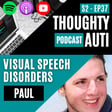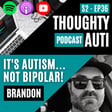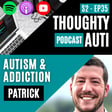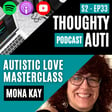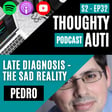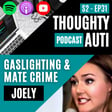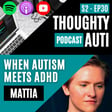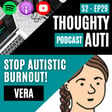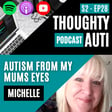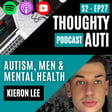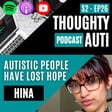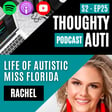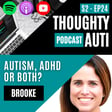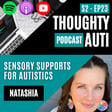
Autism and Philosophy
Why do Autistic people gravitate toward Philosophy? Why did Emily turn from Christianity to Buddhism? What is existentialism and how can it positively or negatively affect someone?
Emily Robyn Clark is a multi-award-winning screenwriter, filmmaker, poet, songwriter, and practicing Buddhist under the SGI organisation. Her film 'Love Spell' (which she wrote, produced, and directed) which won 12 awards and nominated 2 major film festivals.
My Links - https://linktr.ee/thomashenleyUK // Emily's Links - https://linktr.ee/emilyrobynclark
Dbud Noise Cancelling Adjustable Ear Buds (20% OFF with code: THOUGHTYAUTI) - https://dbud.io/thoughtyautipodcast
They start off speaking on the stereotype of autistic people being good at maths and computers, before diving into the controversial practice of type-casting Autistic people and women within the film industry.
Meditation isn't only a spiritual practice, but something backed up by science as being beneficial for mental health and wellness. Emily speaks on her own practices of Gongyo and how her meditative Buddist rituals helped improve her life.
Brought up in Tennessee (USA), in a highly conservative, Christian fundamentalist culture, full of homeschooling, homophobia, and church gatherings... Emily explains her negative experiences within the Religious groups she grew up in and when she first identified she was bisexual.
Thomas speaks on his very secular yet existentialist view on life, going into his history with Christianity and his attraction to Buddist tenants and Philosophies.
Since his youth, Thomas has always questioned the meaning of life and the experiences we have as humans... going through multiple existential crises before exploring Philosophy. Diving into his own perceptions and beliefs he entered a rabbit hole of Nihilistic despair, before realising the power and freedom it gave him for creating his own values and meaning through Positive Nihilism.
Emily and Thomas both arrived at similar conclusions about life and people, just from different angles. For Thomas it was purely theoretical and secular, for Emily it was spirituality and Buddhism.
Unconditional love for your 'enemies', healing familial relationships, Carl Jung archetypes, and the identity within passions were all explored in-depth.
Emily explains the ideas and utility behind Astrology and Tarot Cards for her own life, whilst the unconvinced host postures with position through the lens of science.
Ending on an interesting note, they look into the reasons why Autistic people may gravitate towards spirituality, Religion, and Philosophy... looking at pattern recognition or lateral thinking, influential philosophers, the need for certainty, rituals, and developing your own brand of approaching life.
Song Of The Day (Listen Here) -






